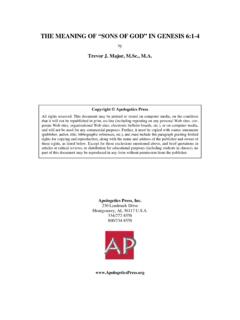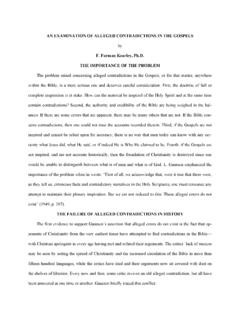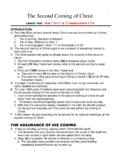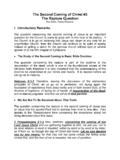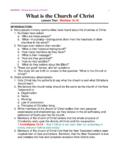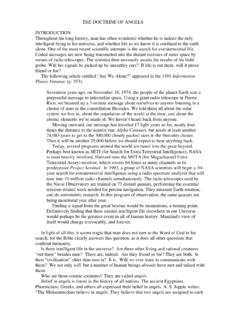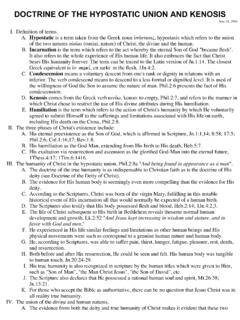Transcription of THE BIBLICAL DOCTRINE OF PREDESTINATION, …
1 THE BIBLICAL DOCTRINE OF predestination , FOREORDINATION, AND ELECTION by F. Furman Kearley, INTRODUCTION The task of this study is to present an exegesis of Ephesians 1:4,5,11, Romans 8:28-30, 2 Thessalo-nians 2:13, Acts 2:23, and Acts 13:48 passages that frequently occur in discussions about the BIBLICAL doctrines of predestination , foreordination, and election. THE PRINCIPAL PROBLEM CONCERNING THESE PASSAGES The principal difficulty concerning these passages centers on the controversy between the advocates of the free will (free moral agency) of man as opposed to the advocates of the view of a deterministic fo-reordination and predestination of man ( , those who stress that both the saved and the lost were elected before the foundation of the world). This conflict has had a long history. For a brief review, one might consult the article on predestination by James Lindsay in the International Standard Bible Encyc-lopedia (1939, 4:2435-2437).
2 The view of deterministic predestination and foreordination that has affected the religious world most profoundly over the past five centuries was set forth by John Calvin. Calvin defined predestination as the eternal decree of God by which He decided before the foundation of the world what is to become of each and every individual. On the other hand Arminius, Wesley, and numerous others modified or direct-ly opposed the Calvinistic interpretation. These opposing views strongly stressed the free will and free moral agency of every person. In trying to arrive at the truth taught by these passages (or, for that matter, any passage), it is neces-sary to practice five basic principles of exegesis (see Chamberlain, 1941, pp. 1-4). First, one must exegete lexically that is, study and understand the meanings of the words as they were understood and used by the original author. Second, one must exegete syntactically that is, understand the syntax or grammar as it was used and practiced by the original author.
3 Third, one must exegete historically that is, study and - 2 -understand the historical background of the original author and his audience. Fourth, one must exegete contextually that is, study the passage carefully in both its immediate and remote contexts. Fifth, one must exegete harmoniously that is, the final interpretation placed upon the passage under consideration must be in harmony with all other passages of Scripture. Obviously, such a thorough exegesis is impossi-ble in a brief manuscript such as this. However, I will present some key ideas and concepts upon which the serious student may build. A STUDY OF CERTAIN KEY WORDS First in order of importance is to discuss the meaning of certain key words and phrases (found both in these passages and elsewhere) that constitute the heart of the problem of understanding what the Bible teaches concerning free moral agency as opposed to predestination and foreordination.
4 The first key word is eklektos (Wigram and Winter, 1978, p. 228), which is translated in the standard versions by such English terms as elect, chosen, and occasionally other synonyms. The word (used 23 times in the Greek New Testament) is employed as a substantive, ranging in function from participle to noun. Another form, eklogee, functions as an adjective and is used 7 times in the Greek New Testament. The verb form, eklegomai, is used 21 times in the New Testament. It is the only form occurring in one of the texts being considered in this study (Ephesians 1:4). However, many of the other 51 verses could well have been included in this study because they relate to the idea of election, foreordination, and predestina-tion. The verb form is used in Luke 6:13 to describe how Jesus chose from among His disciples twelve men who later became His apostles.
5 Luke 10:42 states: Mary hath chosen that good part. Thus the word s principal use is simply to describe the act of selecting or choosing one (or a few) from several oth-er options and possibilities. There is nothing inherent in the word which suggests that the choice has been made long beforehand, or that in any way suggests predestination with regard to the choice. On the other hand, there is nothing inherent in the word that forbids the one doing the choosing from choosing on the basis of predetermined standards or criteria. - 3 -One or another of these words is used on a number of occasions with respect to God s choice (Acts 6:5; 13:17; 15:7; 1 Corinthians 1:27,28; Luke 18:17; Romans 8:33; etc.). Ephesians 1:4 says: Even as he chose us in him before the foundation of the world for us to be holy and unblemished before him in love. While reference is made here in the context to the act of choice being made before the foundation of the world, the context also indicates that the act of choice was as much centered on the kind of life style as on individuals.
6 The passage is saying simply that God chose before the foundation of the world that those whom He would bless with every spiritual blessing would be the ones who would be holy and without blemish before Him in love. The election has to do with selecting or predetermining holy characteristics, not individuals. Additional key words are those from the root, horizo (Wigram and Winter, 1978, pp. 539,656; Arndt and Gingrich, 1957, pp. 584,716; Kittel, 1964, 5:452-453,456). This basic root means to limit or to set limits, to fix or to appoint. This verb form seems to be derived from the articular noun form meaning the boundary. The key word relating to this discussion is proorizo, which occurs in the New Testament 6 times. Of these occurrences, 4 are in the texts under consideration here Romans 8:29-30 and Ephe-sians 1:5,11. The word itself simply means that God predetermined or set beforehand certain bounds, li-mitations, or criteria to be met.
7 Greek scholar Bullinger said of this word: When proorizo is used, the question is not who are its objects, but what they are predestined to do. Proorizo precedes history, and knows who, in history, God foreknows are the subjects of what he has before all history prepared and counseled for them (1975, p. 597). Another word to consider is haireomai, which occurs 3 times in the New Testament (Wigram and Winter, 1978, p. 180). This derives from a root that means to take or to sieze (in the middle voice). It has the meaning of to take for, or to, oneself; to select or choose. When Paul told the Thessalonians that God chose you as first fruits unto salvation by sanctification of the spirit and faith in the truth (2 Thes-salonians 2:13), he simply was saying that in God s providence these were provided the opportunity to hear, believe, and obey the gospel.
8 There is here a textual problem concerning aparchee (Moffatt, 1974, 4:50). The Textus Receptus and many later manuscripts show the word divided and meaning from the - 4 -beginning. However, many ancient manuscripts, and the most recent Greek texts of Nestle and the Unit-ed Bible Society, show it as one word that means first fruits. Many scholars support the translation of first fruits as being the most accurate representation of the best text. Thus, this passage simply relates to choosing where and to whom the gospel should be preached first. It has nothing to do with a preselection of the saved and the lost before the foundation of the world. From the above facts we can see that there is nothing inherent in some of the key words to suggest that individuals were selected before the foundation of the world to be saved, while others were selected before the foundation of the world to be lost.
9 To determine if the passages under consideration teach such a deterministic foreordination and predestination , it is necessary to examine them in their immediate con-text and to exegete them in harmony with the entire teaching of Scripture. THE HARMONIOUS TEACHING OF THE BIBLE CONCERNING ELECTION In the fullest sense, the larger context of every passage of Scripture is the entire Bible. Since God is true, His Word is truth. There can be no contradiction between truth, and the interpretation of a single passage of Scripture must be in harmony with the whole. The clear teaching of the Bible is that God would have all men to be saved, and come to the know-ledge of the truth (1 Timothy 2:4). God does not wish any should perish, but that all should come to repentance (2 Peter 3:9). Peter, who at one time thought only a particular race of people was chosen of God, had to be taught a thorough lesson on this very point.
10 Through the vision he experienced, he learned of a truth I perceive God is no respecter of persons; but in every nation he who fears him and works righ-teousness is acceptable to him (Acts 10:34-35). From these and numerous other passages it is clear that: (a) the Bible teaches that God loves every human being and has acted to make possible the salvation of each one; and (b) the death of Christ was for every man, and makes it possible for every man to receive atonement for his sins. God so loved the world, that he gave his only begotten son, that whosoever believes on him should not perish, but have eternal life (John 3:16). Christ, demonstrating God s love, tasted of death for every man (Hebrews 2:9). He gave himself a ransom for all (1 Timothy 2:6). - 5 -The great commission is aimed toward all men (Matthew 28:18-20; Mark 16:15-16). The invitation is extended to all, according to Revelation 22:17: And the spirit and the bride say, come.

